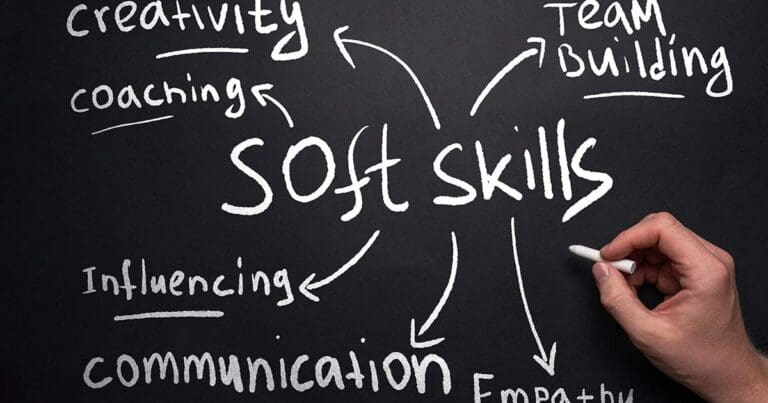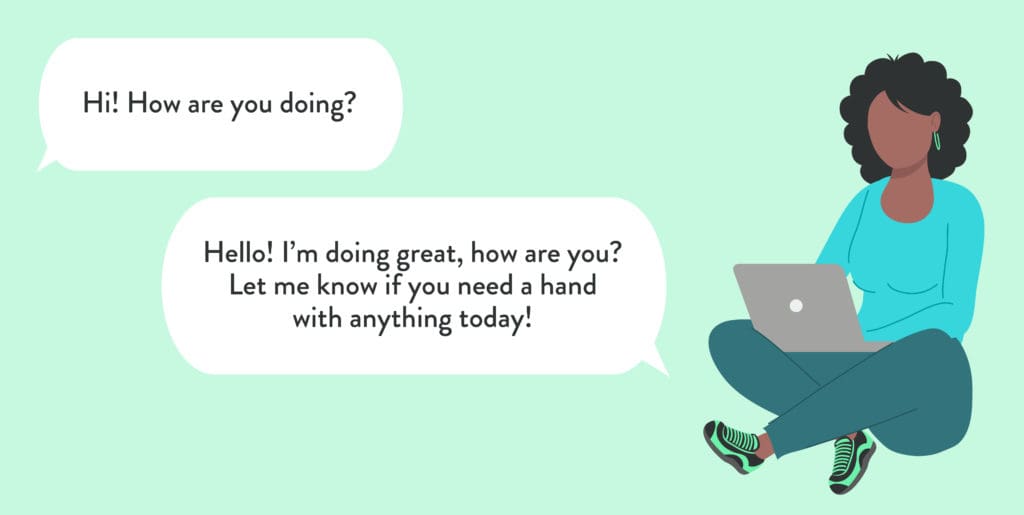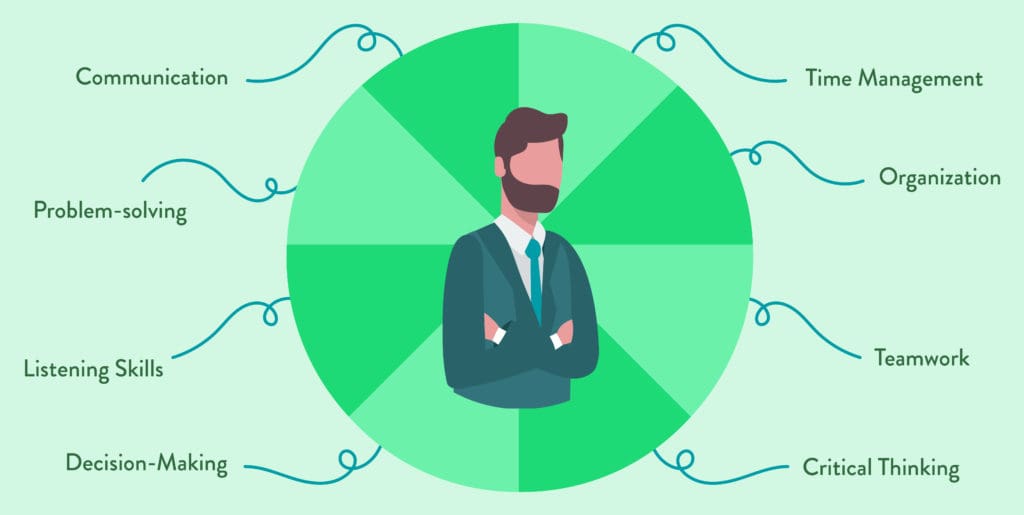The 9 Most Important Soft Skills in the Workplace

In the vast employment landscape, there are certain skills that will always be in demand. There are hard skills like technical skills that can be learned in a classroom or on the job — skills that are specific to the task at hand and can be quantified.
Soft skills, on the other hand, are more difficult to quantify…
In this article, we will discuss what soft skills are and how you can develop them in the workplace. We will also look at how they can help you when looking for a job or filling a role.
And for additional industry insights and staffing trends, our 2023 Salary Guide has all the high-level industry trends you need to inform your hiring strategies.
What are soft skills in the workplace?
Soft skills are the personal qualities that make someone successful in their career. They are also known as interpersonal or non-technical skills. Soft skills include things like communication, problem-solving, and listening skills.
While hard skills like technical skills are specific to the job at hand and can be quantified, soft skills are more difficult to track — After all, how do you measure how good someone is at problem-solving or managing difficult situations?
Which soft skills are most important for employers?
The most important soft skills which employers value are: emotional intelligence, communication, problem-solving, collaboration, critical thinking, conflict resolution, flexibility, leadership and interpersonal skills.
1. Emotional intelligence (EI) soft skills
The National Soft Skills Association (NASSA) defines emotional intelligence as,
“A learned ability to identify, experience, understand, and express human emotions in healthy and productive ways . . . Emotional intelligence skills form the base of competencies that all soft skills are built upon.”
Furthermore, people with high emotional intelligence are better able to navigate through difficult conversations, manage stress and pressure, and resolve conflicts — all qualities that employers value in their employees.
2. Communication soft skills
This one seems like a no-brainer, but you’d be surprised how often communication skill is overlooked. The ability to communicate effectively — both written and verbal — is essential in the workplace. After all, what good are your ideas if you can’t communicate them properly?
People who can communicate their ideas clearly, concisely, and persuasively are usually the ones who get ahead in their careers.

3. Problem-solving soft skills
Problem-solving is another soft skill that is essential in the workplace. No matter what industry you’re in, being able to solve problems quickly and efficiently is a valuable asset.
People who are good at problem-solving are able to see the big picture and identify the root cause of a problem. They’re also able to think on their feet and come up with creative solutions.
4. Collaboration soft skills
Gone are the days when people could succeed in their careers by working alone. In today’s workplace, collaboration and social skills are key.
People who are good at collaborating or have “people skills” are able to work well with others and build relationships easily.
These team players are able to compromise, see things from other people’s perspectives, and exercise strong verbal communication.

5. Critical thinking soft skills
Critical thinking is the ability to think clearly and rationally about a problem or situation. People who are good at critical thinking are able to see both the forest and the trees, so to speak.
They’re able to identify the most important information and make sound decisions quickly. This is a valuable skill in any workplace.
6. Conflict resolution soft skills
Conflict resolution is the ability to resolve conflicts quickly and efficiently.
People who are good at conflict resolution are able to stay calm under pressure and see both sides of a situation. They’re also able to find creative solutions to problems and diffuse difficult situations.
7. Flexibility/Adaptability soft skills
In today’s ever-changing workplace, flexibility and adaptability are essential.
People who are flexible and adaptable are able to roll with the punches and change with the times.
They’re also able to take on new challenges and learn new skills quickly.
8. Interpersonal soft skills
Interpersonal skills are the ability to interact with others effectively.
People who have strong interpersonal skills are able to build relationships easily and communicate effectively.
9. Leadership soft skills
Leadership skills are the ability to inspire and motivate others.
People who have strong leadership skills are able to take charge of a situation and get people to buy into their vision.
They’re also able to delegate tasks and build teams effectively.

Why are soft skills important in the workplace?
Employees with essential soft skills stand out from the crowd and nurturing these types of competencies makes candidates more effective and fulfilled workers.
When it comes to looking for a job or trying to fill a role within your company, the benefits of soft skills cannot be understated.
Need more evidence? In 2017, a joint study done by Boston College, Harvard University, and the University of Michigan found that soft skills training increases productivity and retention by 12 percent, with a 250% ROI.

In addition, workers with strong communication skills are able to build better relationships with clients and co-workers. Not to mention individuals with solid problem-solving skills are better able to find solutions to challenges in their work.
In fact, the Deloitte 2016 Global Human Capital Trends report states that 92 percent of executives consider soft skills a critical priority — we’re not sure what the remaining 8 percent were doing that day. Vacation maybe?
We can say with a great degree of certainty that developing and nurturing these types of skills as a candidate can only serve to drive your success.
How can you develop better soft skills?
The best ways to develop better soft skills in the workplace are through experience and online & offline education.
Developing soft skills through experience
Learning soft skills through general work experience is a tried and true way to develop these capabilities. Hands-on, trial and error, failing forward, in the trenches — whatever you want to call it, being pushed and tested regularly is an effective way to grow and evolve your skill sets in the workplace.
Learning soft skills through online education
Over the years, as the demand for soft skills has grown, new resources to develop these capabilities have become commonplace. Everything from books and articles to online courses and in-person workshops are now available.
Platforms like LinkedIn Learning and Coursera offer a wealth of courses on soft skills, and there are countless books on the subject as well. A quick Amazon search will turn up titles like “The Soft Skills Revolution: Embracing the New Workplace Reality” and “How to Win Friends & Influence People.”
Developing soft skills by combining work experience and continuing education
The best way to develop soft skills is probably a combination of the old and new ways. Work experience will always be the best teacher, but supplementing that with personal development on your own with the resources and tools that best fit your learning styles can only help you grow faster.
There’s no one-size-fits-all solution when it comes to developing soft skills, but a combination of real-world experience and personal development is the best way to go.

How to identify candidates with the right soft skills
Working with a staffing agency that is familiar with the talent they are referring to you is always a good first step.
They will have gotten to know the candidates they work with and can help you identify those with the right mix of soft skills for your needs.
In addition, when writing job descriptions, be sure to include desired soft skills in addition to required qualifications. This will help weed out prospective employees who don’t have the requirements you’re looking for in any given job role.
Final thoughts on soft skills in the workplace
At Mondo, we take a different approach to staffing by staying up to date on the latest employment trends. We believe in finding the right person for the job, not just filling it with someone who meets all of the qualifications on paper.
That’s why we focus on finding candidates with the transferable skills necessary to excel in your company culture and thrive in their role — and we can help you do the same.
We have years of experience matching top talent with companies like yours, so don’t hesitate to reach out and let us know what you need. With our help, you can find the perfect candidate with all the soft skills required to be successful in your business.
Mondo Matches Great Talent With Great Companies
With an expansive, connected network of the top IT, Tech, Creative, and Digital Marketing professionals and a proprietary process, Mondo can match you with the hard-to-find, specialized talent you need.
- Contact Mondo today for all your hiring needs
- Download our 2022 Salary Guide for detailed salary breakdowns for roles & jobs across the technology, creative & digital marketing industries



